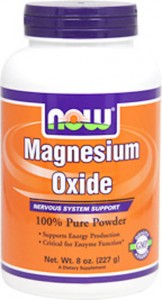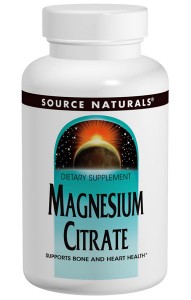If you have been feeling more stressed than usual, perhaps its time to turn to magnesium. Magnesium deficiency is a growing concern all across the world. Because of our fast food culture, the magnesium content of our food is declining. In addition, certain lifestyle factors can cause you to lose your excessive amounts of this vital salt from the body. Magnesium is known as the anti-stress mineral because the nervous system depends upon it for its calming effects.
Few people realize how important this trace mineral is to their overall health and well-being. Magnesium is an essential mineral that is critical for proper functioning of a number of body processes. It influences almost every bodily functions, including energy production, digestion, activation of B vitamins, bone formation, digestion and relaxation of muscles. It is necessary for more 350 enzymatic reactions, including the synthesis of DNA, RNA and ATP. If any of the above mentioned functions can’t be performed well, it leads to irritability, anxiety, stress, tension and other systemic disturbances.
Causes of Magnesium Deficiency
Experts attribute the lack of this important nutrient to three main things – food quality, environmental toxicity and stress. Most Americans eat fried and refined foods, processed in a way that strips out the mineral. Certain medications like diuretics and insulin can cause deficiency of this mineral. Also, deficiency of zinc and other B vitamins can interfere with proper absorption of magnesium, resulting in deficiency of this essential mineral. Finally, stress (physical as well as mental) requires a continuous flow of adrenaline, a hormone that eats up magnesium. When you are stressed, your adrenal glands release stress hormones cortisol and adrenaline to your blood stream. These hormones cause the deficiency of this important nutrient through urine. As discussed above, this important nutrient is also required to counteract the effects of stress. Hence, it creates a vicious circle where low levels of magnesium lead to more stress, anxiety, irritability, insomnia and fatigue.
Magnesium and Stress
Also known as ‘the original chill pill‘, this vital mineral has been linked to stress and anxiety. Appropriate levels of this vital nutrient helps in maintaining healthy functioning of all organs, and keeps stress and anxiety at bay. It combats stress by regulating cortisol levels in the body. Cortisol is a natural stress nutrient – the high levels of which causes stress and anxiety. It also regulates melatonin, which is an essential nutrient required for a good night sleep. Low levels of this essential mineral can lead to symptoms like anxiety, exhaustion, irritability and sleeplessness.
Sources of Magnesium
Magnesium is abundantly found in natural food sources. The key is to consume healthy foods in their natural state. Some of the good sources of magnesium include spinach, beetroot, banana, pumpkin seeds, kale and quinoa. Another great relaxing way to obtain sufficient magnesium is to take a bath in Epsom salts. It is also recommended that you supplement with this nutrient. These supplements provide the recommended amount of nutrient in the most absorbable form. Magnesium oxide and magnesium citrate are both commonly available as supplements.
References
http://blog.tranquilene.com/magnesium-for-stress-and-anxiety/
http://www.mensjournal.com/health-fitness/health/magnesium-the-missing-mineral-20140117





Leave a Reply